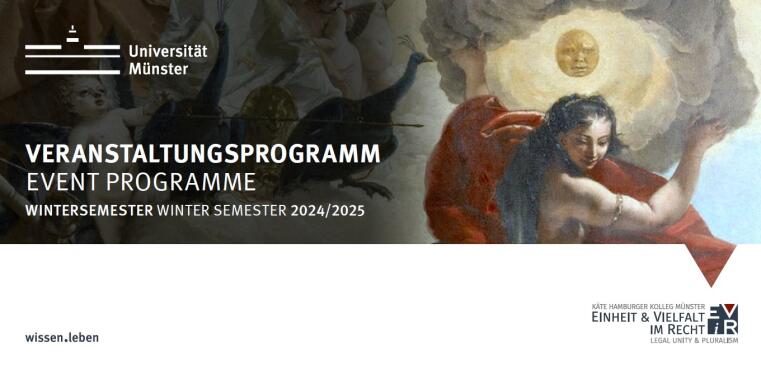Workshop programme in the winter semester
The Käte Hamburger Kolleg's event programme for the winter semester 2024/2025 has been published and can be downloaded here. Five thematically diverse workshops and conferences with international participation will take place at the Kolleg in the coming months. They will deal with questions of Roman inheritance law in antiquity as well as early modern canon law, rules of exception in modern European law and indigenous cultural inheritance law.
On 22 and 23 October, anthropologist João Figueiredo (Münster) and legal historian Sebastian M. Spitra (Münster/Vienna) will organise the workshop Indigenous Law: Plural Pathways to Reclaiming Heritage. Indigenous law dates back to the time before colonisation and continues to develop today. A particular focus of the workshop will be on ways of reclaiming cultural heritage and formulating future perspectives.

The ancient Roman law of codicils will be the subject of the conference Das antike römische Recht der Kodizille from 13 to 15 November 2024. Organised by legal historians Éva Jakab (Budapest), Hesi Siimets-Gross (Tartu), Salvatore Marino (Naples), Sebastian Lohsse (Münster) and Peter Oestmann (Münster), the conference will examine the actors, motivations and practical significance of the coexistence of formal testamentary law and codicil law in ancient Rome.
The workshop The Dark Side of the Moon: Church Legal Regimes between Unity and Plurality (XVI-XVIII Centuries), organised by historian Marco Cavarzere (Venice) on 21 and 22 November 2024, will focus on the relationship between the papacy and the emerging territorial states. The latter became important political actors in the early modern period, while the church was able to assert its pivotal role in the legal field. The workshop will focus on the reaction of ecclesiastical tribunals to this new political balance.
On 4 February 2025, a Conceptual Forum, organised by Benjamin Seebröker, will focus on "Justiznutzung" (use of justice). Instead of viewing justice as an authoritarian instrument of discipline, the concept, which was largely coined by Martin Dinges, focuses on the actors and their active use of justice to resolve conflicts. As usual in the Conceptual Forum series, researchers from different disciplines will discuss the benefits and limitations of the concept from their respective perspectives.
The last conference of the semester will take place from 26 to 28 March 2025. Organised by legal historians Gregor Albers (Linz) and Hans-Peter Haferkamp (Cologne), the event Ausnahme und Vielfalt im Recht seit der Französischen Revolution (exception and plurality in law since the French Revolution) follows on from the previous conferences on Roman and pre-modern law. This time, the participants will examine the tense relationship between unity and plurality in 19th and 20th century law. The focus will be on rule-exception thinking and other approaches used by legal scholars in an attempt to overcome this tension.

